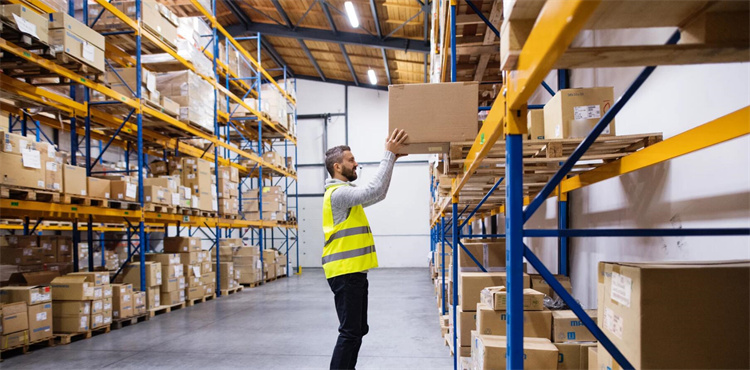How Advanced Tech is Shaping the Future of Logistics in 2025

The logistics industry is undergoing a remarkable transformation. Advanced technology is reshaping supply chains, making operations faster and more transparent. Companies like DHL use AI for route optimization and IoT for asset tracking, while blockchain enhances security. Automation in warehouses reduces errors and boosts efficiency, especially in e-commerce and transportation sectors.
Key Takeaways
Smart tech like AI and IoT is changing logistics. It helps supply chains work better and stay clear.
Robots and machines in warehouses boost work speed and cut mistakes. This makes logistics quicker and more dependable.
Being eco-friendly is important for future logistics. Companies use electric cars and green energy to help the planet.
Key Technologies Transforming the Logistics Industry

Artificial Intelligence (AI) in Logistics Technology
Artificial intelligence is revolutionizing logistics technology by enhancing efficiency and decision-making. You can see its impact in predictive analytics, which helps companies forecast demand and optimize inventory. AI-powered optimization tools improve route planning, reducing fuel consumption by up to 19% for major logistics companies. Machine learning (ML) algorithms analyze vast amounts of data, enabling smarter logistics optimization and reducing uncertainty in operations. By 2030, AI is expected to outperform humans in repetitive tasks, empowering you to focus on strategic decisions. With AI-driven logistics technology trends, the logistics industry is becoming more agile and resilient.
Internet of Things (IoT) for Smart Supply Chains
IoT is transforming supply chains into intelligent networks. Devices like GPS and RFID sensors provide real-time tracking of assets, ensuring timely deliveries. You can use IoT to monitor inventory levels, triggering automatic replenishment when stock runs low. Predictive maintenance, powered by IoT, detects equipment issues early, minimizing disruptions. Cold chain logistics benefit significantly, as sensors maintain optimal storage conditions for temperature-sensitive goods. These advancements in supply chain technology trends enhance visibility, reduce costs, and improve logistics efficiency.
Blockchain for Secure and Transparent Logistics
Blockchain technology ensures secure and transparent logistics operations. Its tamper-resistant nature protects supply chain data from fraud, safeguarding your business. Real-time tracking capabilities allow you to identify issues quickly, reducing disruptions. Blockchain also fosters collaboration by providing a unified source of information for all supply chain partners. Immutable records simplify compliance and sustainability tracking, making logistics technology more reliable and efficient.
Logistics Automation and Robotics in Warehousing
Automation and robotics are redefining warehousing operations. Autonomous mobile robots (AMRs) handle tasks like order picking and inventory management, boosting productivity. Collaborative robots, or cobots, work alongside humans, ensuring safety while increasing efficiency. Edge computing enables real-time decision-making for robots, optimizing dynamic environments. Logistics automation not only streamlines operations but also supports sustainability by reducing resource use. These innovations in automation and robotics are key technology trends in logistics.
Big Data and Predictive Analytics in Logistics
Big data and predictive analytics are transforming decision-making in logistics. Predictive models enhance visibility across supply chains, helping you prevent delays and identify opportunities. Reliable forecasts optimize inventory management, reducing stockouts and overstocking. By investing in predictive analytics, 77% of logistics partners have boosted profitability. These tools empower you to make data-driven decisions, ensuring logistics optimization and improved efficiency.
Real-World Applications of Logistics Technology
AI-Powered Route Optimization and Delivery
Artificial intelligence is transforming how you manage deliveries. Companies like UPS and Amazon use AI-powered systems to optimize routes, saving time and fuel. For example, UPS’s ORION system has reduced miles driven, cutting fuel costs and emissions. Amazon’s dynamic route planning ensures timely last-mile delivery, even when unexpected changes occur. The table below highlights how AI is revolutionizing delivery operations across the logistics industry:
Company | AI Application | Results |
|---|---|---|
UPS | ORION system | Saved millions of miles driven, reducing fuel costs and emissions. |
Amazon | Dynamic route planning | Optimizes last-mile delivery, ensuring timely arrivals. |
DHL | Smart trucking solutions | Achieved a 20% reduction in transit time and significant fuel savings. |
Domino's | AI-driven delivery planning | Reduced delivery times, enhancing customer satisfaction. |
FedEx | SmartPost program | Saves on fuel and time while ensuring prompt delivery services. |
IoT-Enabled Fleet Management and Monitoring
IoT devices are revolutionizing fleet management by providing real-time insights into vehicle performance and safety. You can use predictive maintenance to reduce downtime and costs, while optimized routes lower fuel consumption. Near-real-time monitoring enhances safety for drivers and cargo, ensuring compliance with regulations. IoT also supports sustainability by tracking fuel usage and reducing carbon footprints. These advancements make your fleet operations more efficient and environmentally friendly.
Blockchain in Supply Chain Tracking and Security
Blockchain technology enhances supply chain transparency and security. It records every detail, from raw material sourcing to product delivery, improving traceability. Companies like Pfizer use blockchain to track pharmaceuticals, reducing counterfeit risks and ensuring patient safety. Ford employs blockchain to monitor auto parts, boosting efficiency and trust. Blockchain also simplifies recall management, helping you identify affected products quickly. This innovation ensures better risk management and streamlined logistics processes.
Autonomous Vehicles and Drones in Logistics
Autonomous vehicles and drones are reshaping transportation in logistics. Self-driving trucks and parcelcopter drones promise to improve efficiency and reduce costs. These technologies already support supply chain activities, with automated guided vehicles and robotic pickers widely used in warehouses. As advancements continue, drones will play a critical role in last-mile delivery, creating a more sustainable future for the logistics industry.
Robotics in Fulfillment Centers and Warehousing
Robotics improve efficiency and safety in fulfillment centers. Robots like the Sequoia system accelerate inventory management, while Hercules mobile units transport items using 3D navigation. Robotic arms like Sparrow enhance order aggregation, and Proteus optimizes package movement. These innovations allow you to process orders faster, reduce errors, and maximize space utilization. By automating repetitive tasks, robotics also improve workplace safety, minimizing risks for human workers.
Challenges and Barriers in the Logistics Industry
Cybersecurity Risks in Logistics Technology
As logistics technology advances, cybersecurity risks become a growing concern. You face threats like ransomware attacks, which can encrypt critical data and disrupt operations, leading to delays and financial losses. Data breaches are another challenge, exposing sensitive information and causing identity theft or legal complications. Phishing and social engineering attacks target employees, tricking them into granting unauthorized access to systems. These risks highlight the importance of robust cybersecurity measures to protect your supply chain and maintain trust in the logistics industry.
Workforce Upskilling for Advanced Supply Chains
The rapid evolution of supply chains demands a skilled workforce. Upskilling helps employees improve their current roles, while reskilling prepares them for new positions. Both strategies ensure your team adapts to technological advancements. You can provide access to online learning platforms, organize workshops led by experts, and establish mentorship programs. Flexible e-learning tools and simulation-based training offer hands-on practice. Collaborating with universities for advanced courses also strengthens your workforce. By prioritizing training, you enhance productivity and prepare for the future of logistics.
High Initial Costs of Logistics Automation
Adopting automation in logistics comes with significant financial challenges. High initial costs, often reaching millions of dollars, can deter investment. Long payback periods add to the strain, as savings from automation may take years to materialize. Ongoing maintenance expenses for automated systems further impact your return on investment. Without a clear strategy, these costs can lead to wasted resources. Careful planning and phased implementation help you overcome these barriers and maximize the benefits of automation.
Infrastructure Gaps in Emerging Markets
Infrastructure gaps in emerging markets create hurdles for logistics operations. Poor road networks, limited rail connectivity, and inadequate port facilities slow down transportation and increase costs. These challenges affect e-commerce growth and disrupt supply chains. You must navigate diverse customs regulations and address inconsistent power supplies. Investing in infrastructure development and leveraging technology can help you overcome these obstacles. By addressing these gaps, you unlock new opportunities and expand your logistics network.
Sustainability and Green Logistics Solutions

Electric Vehicles (EVs) and Alternative Fuels in Logistics
Electric vehicles (EVs) and alternative fuels are transforming the logistics industry by reducing carbon emissions and promoting sustainability. EVs offer a cleaner alternative to traditional diesel-powered trucks, especially for last-mile delivery in urban areas. Logistics companies are also adopting biofuels, hydrogen, and compressed natural gas (CNG) to power their fleets. These fuels reduce greenhouse gas emissions and improve air quality. By transitioning to EVs and alternative fuels, you can lower your environmental impact while meeting growing demands for eco-friendly transportation solutions.
Route Optimization for Carbon Emission Reduction
Route optimization plays a critical role in reducing carbon emissions across supply chains. Advanced routing software minimizes travel distances, helping you save fuel and reduce CO2 emissions. It considers traffic patterns and vehicle loads to create efficient routes. This technology also helps drivers avoid congestion, improving delivery times and cutting tailpipe emissions. Optimizing load capacity reduces the number of trucks on the road, further decreasing fuel usage. These strategies make your logistics operations more sustainable and cost-effective.
Circular Supply Chains for Waste Reduction
Circular supply chains focus on minimizing waste and maximizing resource efficiency. They prioritize using recycled or renewable materials instead of virgin resources. Designing products for longevity and recycling ensures that items can be reused or disassembled at the end of their life cycle. By closing the loop on product life cycles, you can reduce waste and create a more sustainable supply chain. This approach aligns with global efforts to achieve zero waste and promote environmental responsibility.
Renewable Energy in Warehousing and Operations
Warehouses are increasingly adopting renewable energy to reduce their carbon footprint. Solar panel installations generate clean energy, powering lighting, heating, and cooling systems. In windy regions, small wind turbines and microgrids enhance energy independence. Warehouse management software integrates with these renewable systems, optimizing energy use and efficiency. By embracing renewable energy, you can lower operational costs and contribute to a greener logistics network.
JUSDA ESG: Driving Sustainable Supply Chain Solutions
JUSDA ESG leads the way in sustainable supply chain solutions. Its platform integrates advanced technologies like IoT and big data to optimize logistics operations while reducing environmental impact. JUSDA’s focus on multimodal transportation and real-time collaboration minimizes carbon emissions. The company’s commitment to ESG principles ensures that your supply chain remains efficient, transparent, and eco-friendly. By partnering with JUSDA, you can achieve sustainability goals and adapt to the future of green logistics.
Future Outlook for the Logistics Industry in 2025
Hyper-Personalized Delivery Services in Logistics
Hyper-personalized delivery services are redefining how you experience logistics. Companies now use customer data to tailor offerings, ensuring a seamless and unique delivery experience. Luxury brands lead this trend by offering VIP services that elevate the shopping journey. Younger consumers increasingly demand eco-friendly delivery options, and many are willing to pay a premium for sustainable solutions. By leveraging data analytics and machine learning, businesses can predict your preferences and provide services that align with your expectations. This shift toward hyper-personalization enhances customer satisfaction and sets a new standard for the logistics industry.
Digital Platforms for Supply Chain Collaboration
Digital platforms are transforming supply chain collaboration. These platforms centralize communication, allowing all partners to interact seamlessly. Real-time data sharing ensures you have immediate access to critical information, improving decision-making and operational efficiency. Advanced analytics tools further enhance collaboration by optimizing logistics and refining forecasting accuracy. With these platforms, you can expect smoother operations and stronger partnerships across the supply chain.
Smart Cities and Urban Logistics Innovations
Smart cities are driving innovations in urban logistics. Real-time data from IoT devices and sensors helps you make informed decisions about transportation and delivery. Sustainable solutions like electric vehicles, autonomous robots, and bike couriers reduce environmental impact. Last-mile delivery challenges are addressed through smart lockers, drones, and autonomous vehicles. These advancements improve supply chain visibility and create a more efficient urban logistics network.
Data-Driven Decision Making in Logistics Technology
Data-driven decision-making is shaping the future of logistics technology. Reliable big data analytics uncover hidden bottlenecks, helping you optimize operations. Predictive analytics anticipates demand patterns, while real-time monitoring enhances supply chain visibility. Companies now invest in advanced tools to gain actionable insights, improving service and refining strategies. By focusing on data, you can exceed customer expectations and tackle modern logistics challenges effectively.
JUSDA's Role in Shaping the Future of Logistics
JUSDA is at the forefront of logistics innovation. Its advanced platforms integrate IoT, big data, and AI to optimize supply chain operations. By focusing on sustainability, JUSDA minimizes carbon emissions through multimodal transportation and real-time collaboration. The company’s commitment to ESG principles ensures your supply chain remains efficient and eco-friendly. With JUSDA, you can embrace the future of logistics confidently, knowing your operations are both cutting-edge and sustainable.

JUSDA Solutions
To provide you with professional solutions and quotations.
Advanced technology is transforming the logistics industry, making supply chains more efficient and transparent. Automation reduces errors, while AI optimizes inventory and cuts costs. Companies like JUSDA lead with sustainable solutions, including green transportation and blockchain for transparency. By 2025, logistics will prioritize eco-friendly practices, data-driven decisions, and customer-centric innovations.
See Also
Innovative Logistics Technologies Shaping Our Future Today
Navigating Tomorrow's Logistics Through Digital Innovations
Transforming Supply Chains With Artificial Intelligence Solutions
Get Prepared: Discovering New Transport Technologies for Logistics
Automation in Warehousing: Advantages of Advanced Manufacturing Technologies
